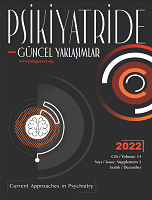Association of Life Satisfaction, Cognitive Distortions About Relationships and Psychological Vulnerability with the Fear of Happiness Among Teachers
Association of Life Satisfaction, Cognitive Distortions About Relationships and Psychological Vulnerability with the Fear of Happiness Among Teachers
Author(s): İmran ElmasSubject(s): School education, State/Government and Education, Social psychology and group interaction, Personality Psychology, Sociology of Education
Published by: Çukurova Universitesi Tip Fakultesi Psikiyatri Anabilim Dalı
Keywords: fear of happiness; life satisfaction; interpersonal cognitive distortions; psychological vulnerability;
Summary/Abstract: This study examined the relationship of teachers’ interpersonal cognitive distortions, life satisfaction, and psychological vulnerability on fear of happiness. The study group consists of 738 teachers who work in the center and districts of Hakkari province in the 2020-2021 academic year and voluntarily participated in the research. Personal Information Form, Fear of Happiness Scale, Interpersonal Cognitive Distortions Scale, The Satisfaction with Life Scale, and Psychological Vulnerability Scale were used to collect data in this study. As a result of the analysis, it was determined that there was a moderately positive relationship between fear of happiness and interpersonal cognitive distortions, a low negative relationship between life satisfaction, and a low-level positive relationship between psychological vulnerability. It was determined that there was a low-level negative relationship between life satisfaction and relationship-related cognitive distortions and psychological vulnerability, and a positive significant relationship between relationship-related cognitive distortions and psychological vulnerability. Stepwise Regression analysis was used to determine whether interpersonal cognitive distortions, satisfaction with life, and psychological vulnerability were predicted on fear of happiness. As a result of the analysis, it was determined that cognitive distortions, life satisfaction, and psychological vulnerability variable had a statistically significant effect on fear of happiness.
Journal: Psikiyatride Güncel Yaklaşımlar
- Issue Year: 14/2022
- Issue No: Suppl. 1
- Page Range: 147-156
- Page Count: 10
- Language: English

